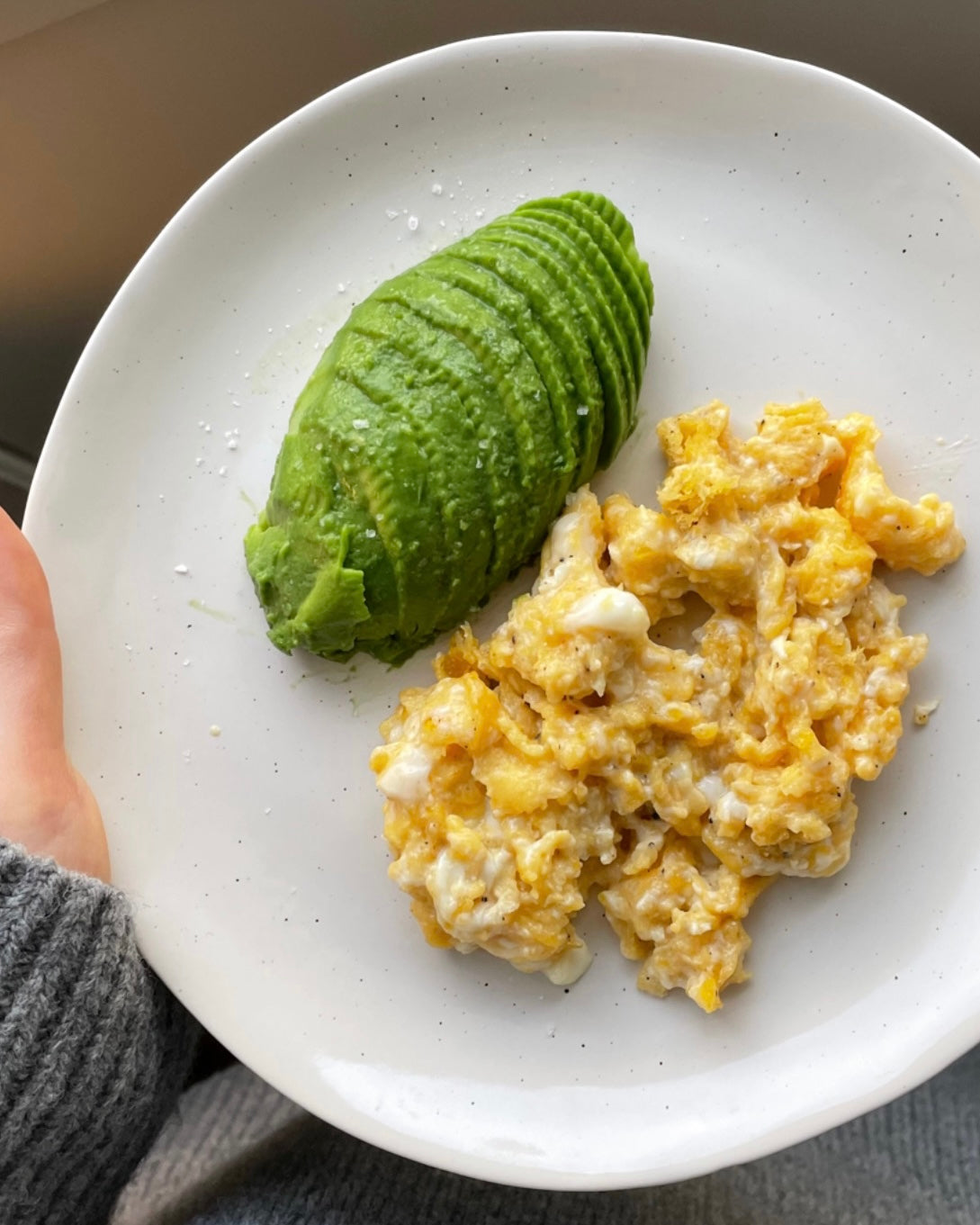Something that had passed us by until we started getting involved in research was that nutrition has an enormous power to influence whether we get PMS and how strong it becomes! What we eat affects our hormones, and depending on which levels our hormones are in relation to each other, affects which symptoms we may experience during the course of the menstrual cycle . When the body gets enough nutrition (and can absorb the nutrition in what we eat), we can reduce and in many cases get rid of PMS. How amazing?
Now we wanted to guide you in how certain types of food, nutrients and foods can have an impact on your menstrual cycle.
Which vitamins and minerals are essential for the menstrual cycle?
Research shows that the following vitamins and minerals have a crucial function for the menstrual cycle: vitamin B , selenium, zinc, vitamin D, magnesium and vitamin A. Having normal levels is a prerequisite for you to feel as good as you are designed to feel.
Sometimes we don't get enough from the food we eat, so supplements may be needed. Always talk to an expert before choosing to take nutritional supplements to make sure you are taking the right doses and supplements.
Avoid nutritional deficiencies – they affect the menstrual cycle
If you have nutritional deficiencies, your hormones cannot work as they are meant to. If your hormones are out of balance, it will affect the outcome of your menstrual cycle. Sometimes we don't get enough nutrition from the food we eat, so supplements may be needed. As we know, the menstrual cycle affects everything from mood, hunger, sleep, how hungry we are for intimacy and how extroverted versus introverted we feel. If you have nutritional deficiencies, it can be expressed by worsening PMS symptoms. Did you know that the term PMS includes over 200 symptoms ? So it can be anything from sore breasts, severe period pains, diarrhea, headaches, worry and anxiety.
Take care of your gut flora
In order for you to have a functioning menstrual cycle, it is important that you have a functioning bowel . How is it that? Yes, because when the intestine does not function optimally, you cannot absorb the nutrients in what you eat. When you cannot absorb the nutrients in what you eat, the body does not get the building blocks needed to produce enough hormones, which can lead to hormonal imbalance, which can be expressed in various symptoms such as PMS, thyroid problems and other menstrual-related diagnoses such as PCOS , endometriosis and PMDS .
Having a functioning gut is also important for your body to be able to get rid of leftover and used-up hormones that otherwise continue to circulate in the body and disrupt the natural hormone balance. For example, if you can't get estrogen out properly, it can lead to increased PMS symptoms during phase three (before your period).
In phase three, many of us probably recognize ourselves in being able to feel extra sensitive in our moods. It's also not uncommon (but just because it's common doesn't mean it's normal) for many women to experience low mood, worry and anxiety before their period. One of your important neurotransmitters, serotonin (which helps you feel increased feelings of happiness and well-being) is formed in the gut - making it extra important to keep the gut healthy. Because when the gut feels good and functions as it should, it will affect your well-being.
Adapt what you eat based on the discomfort you experience during the menstrual cycle
We are all unique and we react in different ways to different foods. However, what is fundamental for all people is that we need to get enough food (that is, not to be at a deficit) and that we need to get enough nutrition for our menstrual cycle to function optimally. By giving the body the building blocks it needs in the form of energy and nutrition, it is possible to prevent and reduce PMS symptoms that may occur during the course of the month. Surely it is incredible?
What is also important to underline is avoiding foods that you are sensitive to or cannot tolerate . Because when you eat foods that you cannot tolerate, it contributes to increased stress and inflammation for the body, which will affect your hormones. Exactly which foods are good for you also differs depending on whether or not you have a period-related diagnosis. For example, if you have PCOS, which is linked to insulin sensitivity, a tip is to reduce the number of dates, dried fruit, to use green bananas instead of ripe ones and to change oatmeal to nut flour. In the case of endometriosis , which is driven by inflammation, a tip is to reduce foods that can contribute to increased inflammation, such as white sugar, gluten, milk or heavily processed foods.
Does caffeine help or wreak havoc on your menstrual cycle?
How many of us do not love the first cup of coffee in the morning? We know, it is sacred. If, however, you experience PMS symptoms in phase 3, a tip might be to cut back on caffeine . Many women experience increased stress before their period and what caffeine does is stress the body further. Therefore, many women feel better by cutting back on caffeine during this period. Suggested substitutes are tea, golden latte, a hot cocoa drink, kombucha or Chicca Roast .
Caffeine is not only found in coffee, but also in energy drinks, sports drinks, tea and to some extent in cocoa. So keep in mind that it's not just coffee that can be the culprit. Caffeine is a debated topic where research points to both positive and negative health effects. How exactly you are affected by caffeine depends partly on genetics, whether you can break down caffeine slowly or quickly, and on your lifestyle. Evaluate how caffeine makes you feel, maybe it would be worth trying to abstain?
How does sugar affect the menstrual cycle?
Too much sugar can negatively affect your hormones and your menstrual cycle. When you give your body more sugar than it can handle, it causes your blood sugar levels to skyrocket and then crash, something you've probably experienced at some point. So what does too much mean? It is individual and affected by genetics, if you had blood sugar problems earlier in life, what you eat in general and how much stress you have in your life, both physically and emotionally.
When you eat too much sugar, it contributes to strong blood sugar fluctuations, which can cause your hormones to become unbalanced. The body perceives strong blood sugar fluctuations as stress, which means that it has to work hard to regulate and balance blood sugar. This causes cortisol in the body to increase, which in turn can create inflammation that can lead to worsening PMS and irregular cycles. So choose natural sweeteners as much as possible and avoid white sugar.
Tips for PMS:
- Get enough of the body's building blocks: fat, protein and carbohydrates.
- Cut back on caffeine, instead choose tea, kombucha or something else you like.
- Get more B6, magnesium, zinc and potassium in the food you eat.
- Use physical activity to relieve PMS and kick-start feel-good hormones.
In addition to diet and nutrition, lifestyle as a whole has an impact on how your menstrual cycle is expressed during the month. An important reminder is that we are a whole where all parts of our lifestyle and how we feel, our inner being, have an impact on how we will experience our menstrual cycle during the course of the month. From the time you make a change in what you eat, it can take around three months before you see an effect and improvement of imbalances in your menstrual cycle. What kind of effect you see depends on what imbalances you have and how you support the other parts of your lifestyle. If you do not notice an immediate difference, it is important to know that it usually takes one to three cycles before you notice a difference. Be patient - you're on the right track!
Sources and relevant reading
PMS
Abraham, G. (1983). Nutritional factors in the etiology of the premenstrual tension syndromes. J Reprod Med. Jul;28(7):446-64. https://www.ncbi.nlm.nih.gov/pubmed/6684167
Andrews, M., et al., 2015. Dietary factors and luteal phase deficiency in healthy eumenorrheic women. Human Reproduction , [online] 30(8), pp.1942-1951. Available at: https://www.ncbi.nlm.nih.gov/pmc/articles/PMC4507331/
Bianco, V., et al.,. 2014. Premenstrual syndrome and beyond: lifestyle, nutrition, and personal facts. Mineva Ginecol , [online] 66(4), pp.365-75. Available at: < https://www.ncbi.nlm.nih.gov/pubmed/25020055
Farasati, N., Siassi, F., Koohdani, F., Qorbani, M., Abashzadeh, K. and Sotoudeh, G., 2015. Western dietary pattern is related to premenstrual syndrome: a case–control study. British Journal of Nutrition, [online] 114(12), pp.2016-2021. Available at: < https://www.ncbi.nlm.nih.gov/pubmed/26459000 >
Shrestha, B. and Gurung, K., 2020. Premenstrual Syndrome (PMS)/Premenstrual Dysphoric Disorder (PMDD): Let's Talk About. Acta Scientific Women's Health , [online] 2(2), pp.01-02. Available at: < https://actascientific.com/ASWH/pdf/premenstrual-syndrome-pms-premenstrual-dysphoric-disorder-pmdd-lets-talk-about.pdf
Stomach and intestines
Dash, S., Clarke, G., Berk, M. and Jacka, F., 2015. The gut microbiome and diet in psychiatry. Current Opinion in Psychiatry , [online] 28(1), pp.1-6. Available at: < https://journals.lww.com/co-psychiatry/Abstract/2015/01000/The_gut_microbiome_and_diet_in_psychiatry__focus.2.aspx
Saha, S., et al., 2014. Menstrual Cycle Changes in Women with Inflammatory Bowel Disease. Inflammatory Bowel Diseases , [online] 20(3), pp.534-540. Available at: < https://www.ncbi.nlm.nih.gov/pmc/articles/PMC4347838/
Weber, A., et al., 1995. Gynecologic history of women with inflammatory bowel disease. Obstetrics & Gynecology , [online] 86(5), pp.843-847. Available at: < https://pubmed.ncbi.nlm.nih.gov/7566861/
Caffeine
Kotsopoulos, J., Eliassen, A., Missmer, S., Hankinson, S. and Tworoger, S., 2009. Relationship between caffeine intake and plasma sex hormone concentrations in premenopausal and postmenopausal women. Cancer , [online] 115(12), pp.2765-2774. Available at: < https://www.ncbi.nlm.nih.gov/pmc/articles/PMC2764240/
Lyngsø, J., Ramlau-Hansen, C., Bay, B., Ingerslev, H., Hulman, A. and Kesmodel, U., 2017. Association between coffee or caffeine consumption and fecundity and fertility: a systematic review and dose&ndash ;response meta-analysis. Clinical Epidemiology , [online] Volume 9, pp.699-719. Available at: < https://www.ncbi.nlm.nih.gov/pmc/articles/PMC5733907/
Rossignol, A., 1985. Caffeine-containing beverages and premenstrual syndrome in young women. American Journal of Public Health , [online] 75(11), pp.1335-1337. Available at: < https://ajph.aphapublications.org/doi/pdfplus/10.2105/AJPH.75.11.1335
Schliep, K., Schisterman, E., Mumford, S., Pollack, A., Zhang, C., Ye, A., Stanford, J., Hammoud, A., Porucznik, C. and Wactawski-Wende, J ., 2012. Caffeinated beverage intake and reproductive hormones among premenopausal women in the BioCycle Study. The American Journal of Clinical Nutrition , [online] 95(2), pp.488-497. Available at: < https://www.ncbi.nlm.nih.gov/pubmed/22237060
Sugar
Daka, B., Rosen, T., Jansson, P., Råstam, L., Larsson, C. and Lindblad, U., 2013. Inverse association between serum insulin and sex hormone-binding globulin in a population survey in Sweden. Endocrine Connections , [online] 2(1), pp.18-22. Available at: < https://pubmed.ncbi.nlm.nih.gov/23781314/
Puder, J., Blum, C., Mueller, B., Geyter, C., Dye, L. and Keller, U., 2006. Menstrual cycle symptoms are associated with changes in low-grade inflammation. European Journal of Clinical Investigation , [online] 36(1), pp.58-64. Available at: < https://pubmed.ncbi.nlm.nih.gov/16403011/
Than, T., Delay, E. and Maier, M., 1994. Sucrose threshold variation during the menstrual cycle. Physiology & Behavior , [online] 56(2), pp.237-239. Available at: < https://www.sciencedirect.com/science/article/abs/pii/0031938494901899
Rossignol AM, Bonnlander H., 1991. Prevalence and severity of the premenstrual syndrome. Effects of foods and beverages that are sweet or high in sugar content. J Reprod Med . 36(2):131-136.
Wallace, I., McKinley, M., Bell, P. and Hunter, S., 2013. Sex hormone binding globulin and insulin resistance. Clinical Endocrinology , [online] 78(3), pp.321-329. Available at: < https://pubmed.ncbi.nlm.nih.gov/23121642/

